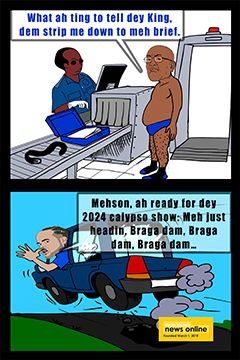NHI Concerned Group proposes tax to cover uninsured, revised role of SS



The letter was signed by the chief actor behind the petition Natalio D. Wheatley aka Sowande Uhuru. The petition eventually garnered over 700 signatures. Wheatley said on the radio show Speak Out BVI last Tuesday evening November 3, 2015 that the Group is still awaiting a formal response from Premier Dr The Honourable D. Orlando Smith.
Among the issues considered egregious by the Group are that the system as being implemented is mandatory, that the statistical underpinnings upon which the main study was conducted was flawed and gave incorrect figures for the percentages of insured and uninsured persons in the territory, that individuals and families will be affected, that there is a persistent culture of secrecy, and that the economic viability of the system is in question.
The Group is proposing that everyone could be registered under a private coinsurance pool, that the uninsured should be registered and individuals with insurance that is equivalent or superior to the NHI should be exempted. They also propose that insured persons can be taxed one to two percent of their salary to pay for the uninsured.
They also suggested the expansion of the remit of Social Security.
“We know that you and your colleagues will examine and scrutinize our submission with a view to seeing how our suggestions might be incorporated so that, at the end of the day, we may receive an optimal system. We honestly believe that it is possible to chart a new way forward based on our collaborative efforts, comprising the brain power of the people of these islands, the business acumen and professionalism of our corporate partners, and the law making and leadership of our government,” the letter said in its conclusion.
Read the letter in its entirety:
13th October 2015
Dr. D. Orlando Smith
Premier
Premier’s Office
Central Administration Building
Road Town, Tortola, British Virgin Islands
Dear Sir:
I wish to thank you, Premier, for agreeing to meet with us, a small delegation from the NHI Concerned Citizens and Residents, to receive our petition and afford us an audience. Let me, at the same time, express gratitude and appreciation to governments, past and present, for their efforts in attempting to provide the people of the BVI with affordable universal health care.
While we believe in the ideal of universal health care, we found some difficulty with the NHI system as proposed and decided to mount a petition drive to see if the government would agree to go back to the drawing board or, as some would put it, “wheel and come again.” We followed this line because we felt that some of the problems could not be easily cured and that a second look would have been necessary. Our efforts found resonance with the public, and the petition drive was inaugurated.
Let me say something about our petition. Firstly, the problems noted are not an exhaustive list, but they were sufficient to get the public’s attention. Secondly, as time went by and more analysis was done, and Government continued to make more information available, additional concerns were unearthed. Some of those concerns are captured in this cover letter. Thirdly, we do not profess that we have the answers to the problems and concerns, but we believe that we have a role, perhaps as a catalyst, in getting government’s attention and encouraging them to seek the views of all stakeholders, including the public at large, the business community, and, of course, the government itself. We believe that, if these three groups can be mobilized, an optimal solution will be found. That then is our goal and the goal of our petition drive.
There are many issues which can be highlighted, but the most egregious are as follows:
a. The system is mandatory. This is anathema to most persons because it takes away their choice to decide for themselves on the way forward for their own lives and those of their family members. Perhaps, most importantly, it flies in the face of the Universal Declaration of Human Rights as promulgated by the United Nations in 1948, Chapter 2 of the BVI Constitutional Order 2007 (based on the UN Declaration), and our traditional and accustomed democratic way of life.
To this the people are saying an emphatic, “NO,” and are saying, in addition, that their freedom of choice should be jealously guarded, defended and maintained.
b. It is alleged that the statistical underpinnings upon which the main study was conducted was flawed and gave incorrect figures for the percentages of insured and uninsured persons in the territory. It, therefore, follows, as the night follows the day, that if your premise is wrong whatever is done in the name of that premise will similarly be wrong. If your shirt is buttoned out of sync, the only true remedy is to start all over again. Accordingly, we do not believe that corrections can resolve the difficulties without a return to basics.
c. Individuals and families will be affected.
• Individuals will most likely lose their private insurance and the life insurance attached to it;
• Some employees, in all likelihood, will be laid off;
• Some individuals may not be able to afford the deductions for both private insurance and NHI or even NHI alone. Consider, for example, unemployed spouses will have to be covered by their partners whereas an unmarried unemployed person is covered by the state;
• Individuals and families will find that overseas health care will be greatly restricted as all such care must be preapproved and this must only be approved if the services are not available locally;
• Women will be forced to birth babies at Peebles Hospital as the cost of overseas delivery will only be paid by the NHI in the event of a medical complication;
• Individuals and families will lose their democratic right to choose or retain their overseas doctors.
d. There is a persistent culture of secrecy. This still seems to linger despite all the discussions about transparency as documents and reports have not always been made available publicly. Also, there are delays in approving various regulations needed for the effective management of NHI.
e. The economic viability of the system is in question. A study done concludes that by year four of operation, there could be a deficit somewhere between $45mil to $200mil, which does not take into consideration lawsuits over confidentiality, malpractice and errors and omissions, which can account for an additional $200 for the same period, thus combining for $400mil in the worst case scenario.
Three pillars are needed for a viable system: (1) A sufficiently large population is needed. This is necessary to ensure the maximum utilization of the service; (2) Operational facilities must be of a certain standard. The BVI is aware of deficits in this regard and efforts are being made to overcome them; (3) Adequate administration needs to be upgraded.
f. The economy will be adversely impacted.
Businesses may be unable to meet additional charges and may have to close;
businesses may pass additional costs on to consumers, thereby forcing the cost of living to increase;
Shuttered businesses will lead to sudden increase in job losses or under employment;
Some insurance businesses may increase the cost of other types of insurance (car, boat, house) to offset the losses under their health insurance portfolio;
High powered expatriate executives may either leave positions in the financial services and tourism sector or prospective employees may refuse to come to the BVI because of the adverse insurance situation.
Fortunately, alternatives to the NHI exist:
Option 1.— Everyone could be registered under a private coinsurance pool.
The insurance industry can be engaged to partner with government to develop the NHI. The insurance industry should come together and write a coinsurance policy with each carrier participating based on the current market share they have in the health insurance industry (this information is available at the FSC).
By making this agreement, the plan would have access to all networks of all companies, and anyone would be able to get worldwide access instead of limited access provided under JIPA.
Additionally, as a group, the companies would be able to buy adequate reinsurance at a reasonable price. Also, by putting a large deductible programme in place this would make the plan even more affordable. The way the plan would work is for the government to commit to covering the first $8 to $10 million in claims, and the remaining cost will be borne by the insurance companies and reinsurers. By activating a large deductible programme and instituting risk management programmes, it would cause the cost of insurance being purchased to be cheaper without any compromise on quality of care while still providing access to the NHI.
Administratively, this would facilitate the smooth transition from registration, policy issuance, reinsurance placement to claims handling. Social Security staff transferred will collect the monies. The board should consist of the following persons: one member from each insurance company, the deputy director of Social Security, a representative from the Health Services Authority, the Financial Secretary and an independent business person.
Option 2.—The uninsured should be registered and individuals with insurance that is equivalent or superior to the NHI should be exempted. However, insured persons can be taxed one to two percent of their salary to pay for the uninsured.
First of all, the uninsured can be registered to get a true picture of how many people are insured in the BVI. The figures given by the insurance companies are real figures gathered from their collective records. Their records, however, do not take into account expats who have insurance from outside the territory. If these were included as insured, the uninsured population could be anywhere within the range of 20% to 30% of the population. It also should not come as a shock to anyone that most of the uninsured would be minimum wage earners. Considering that these numbers are smaller than those reported, the full 7.5% contributions by employers and employees would not be needed, and the uninsured can still use the JIPA network.
Once this number is ascertained, individuals with private health insurance coverage that is equal or superior to the NHI can be exempted from the NHI. By doing this, private insurance policy holders would not have to be subjected to NHI board approval to receive treatment overseas. For this privilege, these policy holders may be subjected to a 1% to 2% tax of their monthly income to pay for the uninsured.
Option 3.— We can use the Dutch Model of providing health insurance coverage for the population.
The Dutch model consists of a partnership between private health insurers and government to cover the entire population. Rather than working in opposition, private insurers and government recognize the crucial role each plays in providing universal coverage and access to quality healthcare.
Option 4.— We can expand the remit of Social Security. In addition to all the benefits currently offered by Social Security, we can include a benefit to insure the small percentage of. To pay for this, we can increase the social security deductions by 1% to 2%.
Conclusion
We wish to express our appreciation of the UWI Economic Unit and the point man, Dr. Theodore, for the yeoman service rendered in the preparation of this project, the Ministry of Health, and, also, the implementation team under the guidance of Mr. Barry for their equally stellar service. We wish them all to know that their service has been appreciated and the fact that the project is being challenged is not to impugn their professionalism; instead, it is an earnest attempt to get optimal value for the people of the BVI—optimum is what we want and optimum is what we intend to get.
We also wish to thank all those persons who signed the petition as it was, indeed, a clear indication of democracy in action and continues to show what could be achieved when we come together as one. Therefore, let this action go forth as a beacon to guide and inspire us for the future. We cannot, of course, fail to mention the foot soldiers for the time and effort they expended in collecting the signatures. Their work was an indispensable part of the project, and we thank them.
We thank also the ad hoc coalition of individuals who comprise the NHI Concerned Citizens and Residents Group for their service, be it on radio, tv, or in the many meetings held. We give a big thank you to everyone.
Finally, I wish to thank you, Hon. Premier, for your willingness to meet with us to receive our petition and to give us an audience.
We know that you and your colleagues will examine and scrutinize our submission with a view to seeing how our suggestions might be incorporated so that, at the end of the day, we may receive an optimal system. We honestly believe that it is possible to chart a new way forward based on our collaborative efforts, comprising the brain power of the people of these islands, the business acumen and professionalism of our corporate partners, and the law making and leadership of our government.
With this triumvirate approach to problem solving, absolutely nothing is beyond our reach. We standby ready, willing, and able to assist, and we await your call in this collaborative effort.
Sincerely,
Natalio Wheatley
NHI Concerned Citizens and Residents Group









.png)




.png)



.png)






















17 Responses to “ NHI Concerned Group proposes tax to cover uninsured, revised role of SS”
Also, the 700 are courageous. How many spoke against the selling of the Wickham's Cay land to a foreigner back in the 60s? What is its outcome today? Did the people of the land lose or did they benefitted from that very small group?
Why don't we simply listen? Are we too arrogant to listen to simple minded (lowly) people?
Why the rush, on such a grand scale at that?
1. If you add up the costs of premiums for a worker earning the maximum income plus a non-working dependent, the cost of NHI is significantly more than cover currently offered by private insurers - and the benefits are more restricted. So NHS will cost those persons more and deliver less. So it's a tax. For what?
2. The Government is taking a dangerous gamble. We all know that for any serious medical issue, the first thing we do here is go to San Juan or Miami (even the Health Minister did that some time ago, as I recall). NHI will coerce people to go to Peebles first. The very first time someone dies or doesn't get timely treatment or fast enough approval of off-island treatment, fingers will be pointed at the Government. Before NHI, the government could shrug and point to the private insurer. Under NHI, the Government bears the risk.
3. NHI is more expensive than private insurers if you make the maximum salary. If we experience any problems with treatment or coverage, the expats who are key to the financial services sector simply won't come here - they will go somewhere else rather than pay more money in premiums to risk their health. If we lose the expats in financial services, that would be a disaster.
4. If you review the NHI's financial projections published some weeks ago, it is clear that unless NHI earns a significant return on premiums invested, there will be a shortfall in funding. That is dangerous because it means that despite people paying more for NHS by way of premiums, the Government will have to inject more money to keep it afloat - and where is that money going to come from (the coffers seem rather empty even now)? "Pay more get less" would seem to be a bad idea to most people.
Why did the Government not just pass mandatory health insurance coverage to be provided by existing private insurers? The private insurers know the industry and by spreading the risk over a larger number of insureds (because private insurers spread the risk across a large number of people - not just BVI) premiums would have been lower. Instead, the Government has opted to set up a whole new, expensive NHI bureaucracy whose "customer base" is small - meaning that it is a MUCH riskier business model.
I have genuine fears that the NHI was not properly thought through and is going to be a disaster for BVI.